2023届高考英语二轮复习: 动词课件(共30张PPT)
文档属性
| 名称 | 2023届高考英语二轮复习: 动词课件(共30张PPT) | 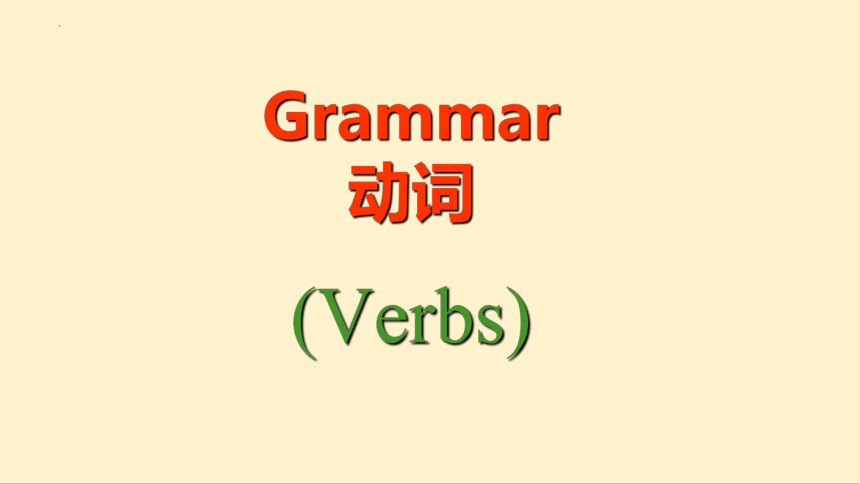 | |
| 格式 | pptx | ||
| 文件大小 | 168.8KB | ||
| 资源类型 | 教案 | ||
| 版本资源 | 通用版 | ||
| 科目 | 英语 | ||
| 更新时间 | 2023-03-13 19:42:45 | ||
图片预览

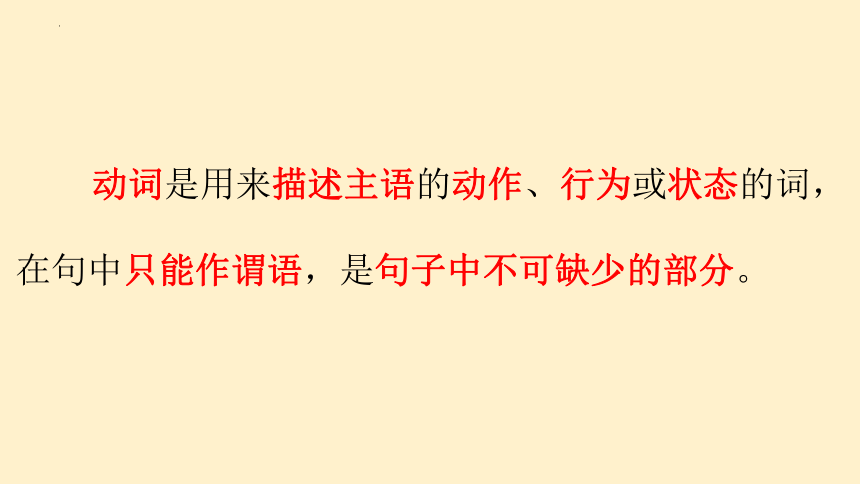
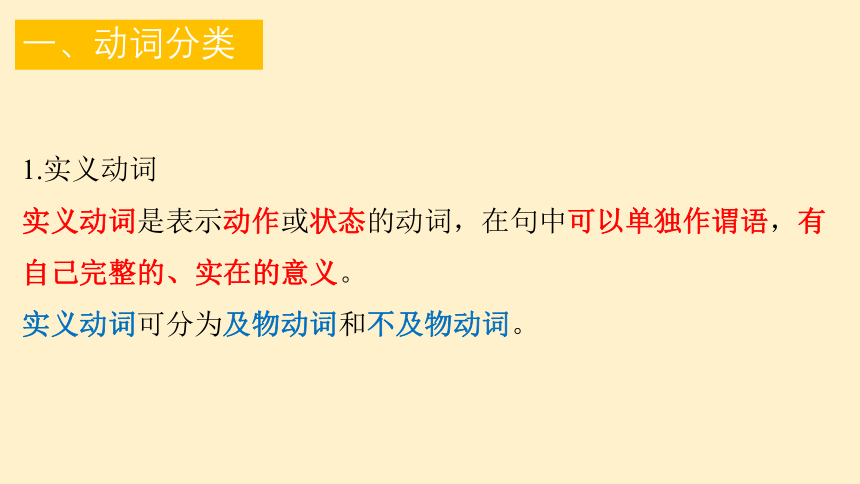

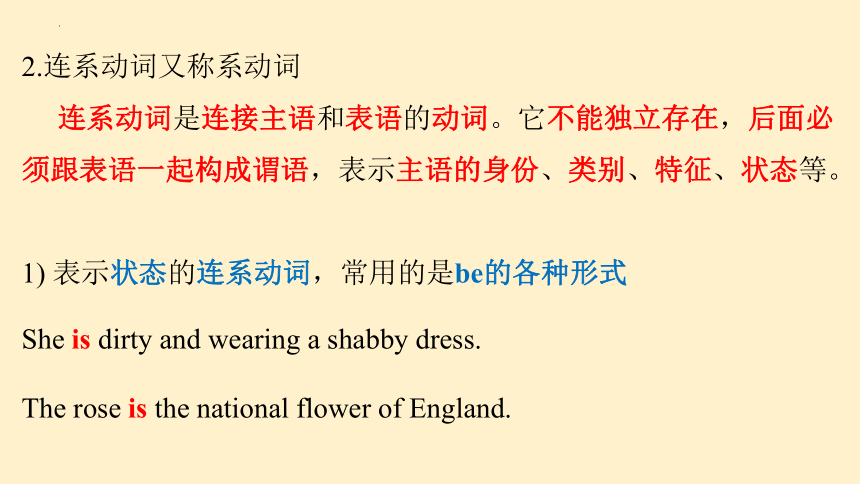
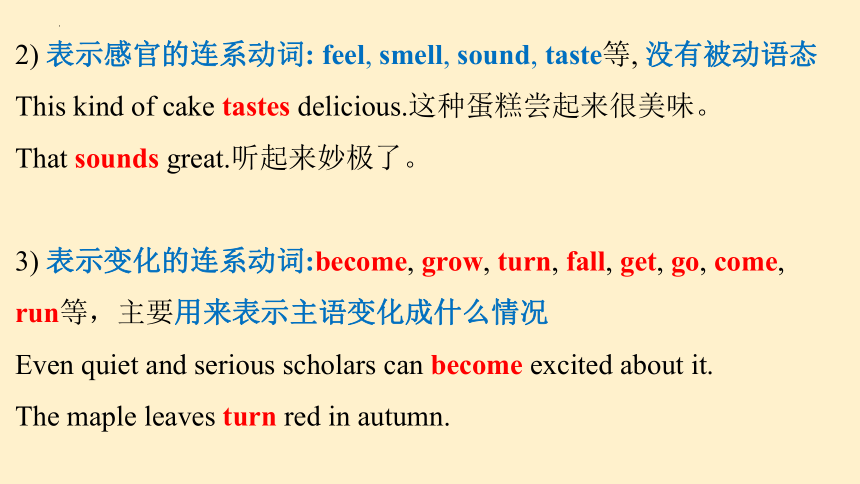
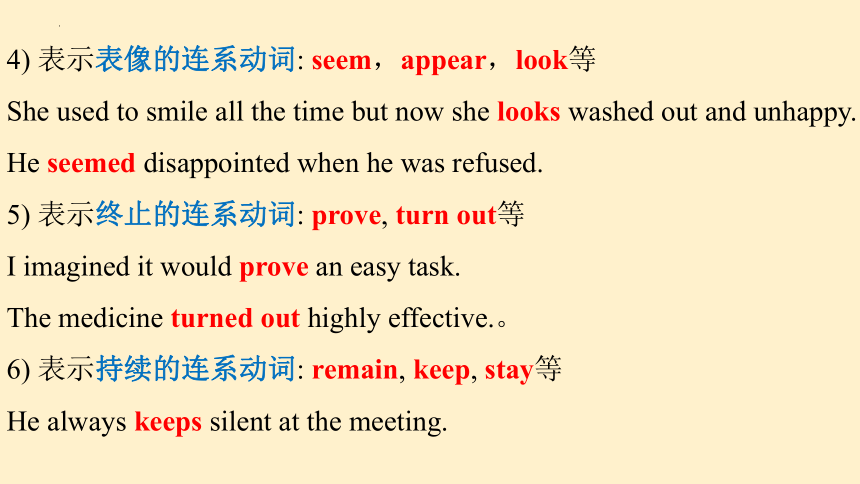
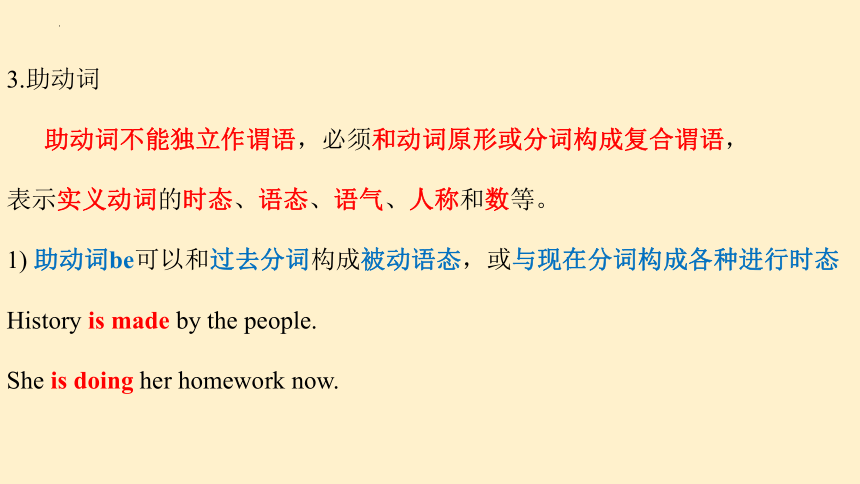
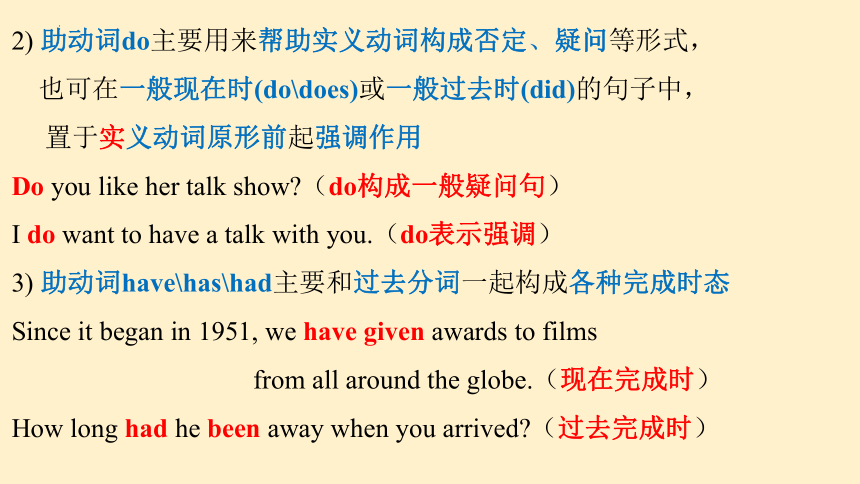
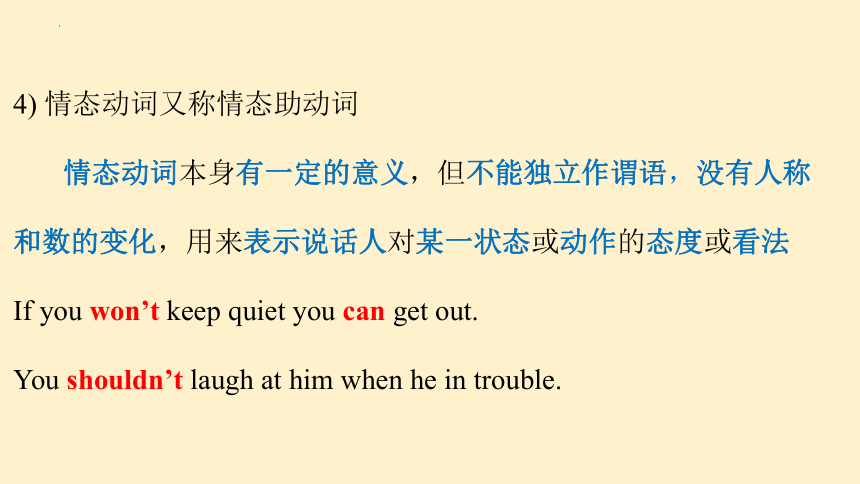
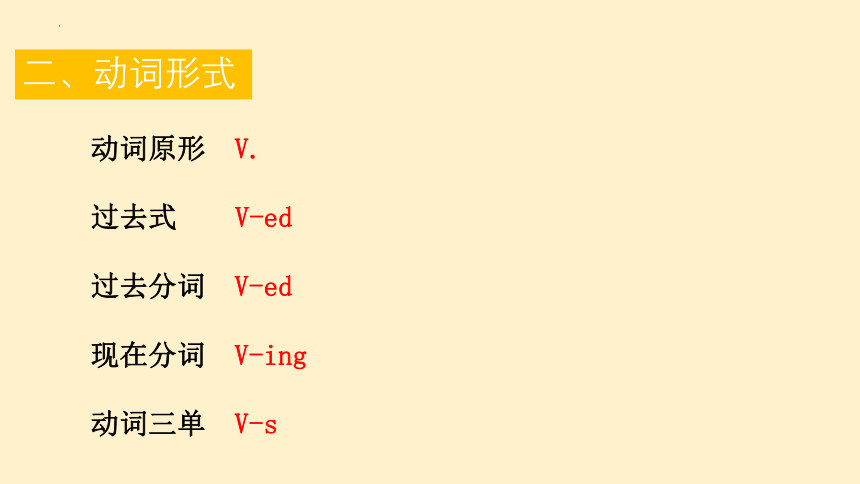
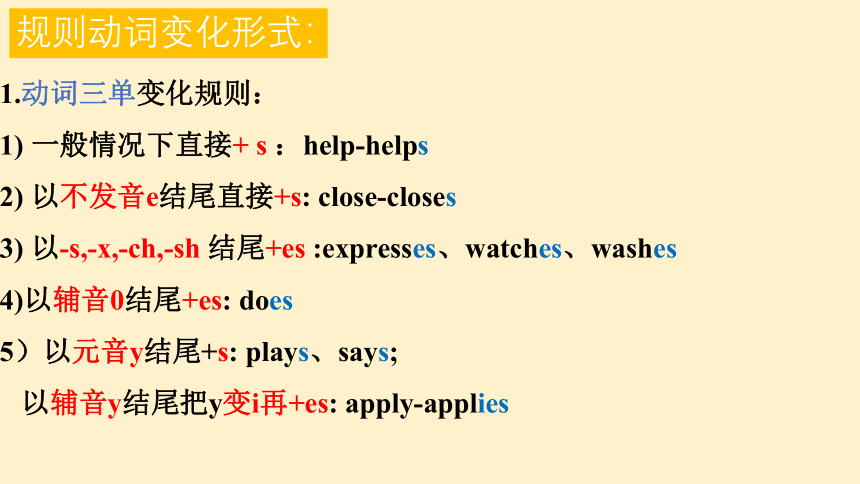
文档简介
(共30张PPT)
Grammar
动词
(Verbs)
动词是用来描述主语的动作、行为或状态的词,在句中只能作谓语,是句子中不可缺少的部分。
一、动词分类
1.实义动词
实义动词是表示动作或状态的动词,在句中可以单独作谓语,有自己完整的、实在的意义。
实义动词可分为及物动词和不及物动词。
1) 及物动词后可直接带宾语
In China,he developed an interest in teaching English to Chinese students.He handed the teacher a slip of paper.
2) 不及物动词后不能直接带宾语
Will looked around carefully.
Some people believe the Devil exists.
2.连系动词又称系动词
连系动词是连接主语和表语的动词。它不能独立存在,后面必须跟表语一起构成谓语,表示主语的身份、类别、特征、状态等。
1) 表示状态的连系动词,常用的是be的各种形式
She is dirty and wearing a shabby dress.
The rose is the national flower of England.
2) 表示感官的连系动词: feel, smell, sound, taste等, 没有被动语态
This kind of cake tastes delicious.这种蛋糕尝起来很美味。
That sounds great.听起来妙极了。
3) 表示变化的连系动词:become, grow, turn, fall, get, go, come, run等,主要用来表示主语变化成什么情况
Even quiet and serious scholars can become excited about it.
The maple leaves turn red in autumn.
4) 表示表像的连系动词: seem,appear,look等
She used to smile all the time but now she looks washed out and unhappy.
He seemed disappointed when he was refused.
5) 表示终止的连系动词: prove, turn out等
I imagined it would prove an easy task.
The medicine turned out highly effective.。
6) 表示持续的连系动词: remain, keep, stay等
He always keeps silent at the meeting.
3.助动词
助动词不能独立作谓语,必须和动词原形或分词构成复合谓语,
表示实义动词的时态、语态、语气、人称和数等。
1) 助动词be可以和过去分词构成被动语态,或与现在分词构成各种进行时态
History is made by the people.
She is doing her homework now.
2) 助动词do主要用来帮助实义动词构成否定、疑问等形式,
也可在一般现在时(do\does)或一般过去时(did)的句子中,
置于实义动词原形前起强调作用
Do you like her talk show (do构成一般疑问句)
I do want to have a talk with you.(do表示强调)
3) 助动词have\has\had主要和过去分词一起构成各种完成时态
Since it began in 1951, we have given awards to films
from all around the globe.(现在完成时)
How long had he been away when you arrived (过去完成时)
4) 情态动词又称情态助动词
情态动词本身有一定的意义,但不能独立作谓语,没有人称和数的变化,用来表示说话人对某一状态或动作的态度或看法
If you won’t keep quiet you can get out.
You shouldn’t laugh at him when he in trouble.
动词原形 V.
过去式 V-ed
过去分词 V-ed
现在分词 V-ing
动词三单 V-s
二、动词形式
规则动词变化形式:
1.动词三单变化规则:
1) 一般情况下直接+ s :help-helps
2) 以不发音e结尾直接+s: close-closes
3) 以-s,-x,-ch,-sh 结尾+es :expresses、watches、washes
4)以辅音0结尾+es: does
5)以元音y结尾+s: plays、says;
以辅音y结尾把y变i再+es: apply-applies
2.现在分词变化规则:
1) 一般情况下直接+ ing :buying、playing
2) 以不发音e结尾去e再+ing: ride-riding write-writing
3) 以重读闭音节结尾,且末尾只有一个辅音字母的,
先双写这个辅音字母再+ing :prefer-preferring refer-referring
occur-occurring eat-eating wait-waiting
4)少数以-ie结尾,先把-ie变为y再+ing:die-dying lie-lying tie-tying
5)以-oe、-ee、-ye结尾直接+ing: seeing、fleeing
3.过去式、过去分词变化规则:
1) 一般情况下直接+ed :help-helped
2) 以不发音e结尾直接+d: like-liked
3)以重读闭音节结尾,且末尾只有一个辅音字母的,
先双写这个辅音字母再+ed:stop-stopped plan-planned
4)以元音y结尾+ed: played、destroyed
以辅音y结尾把y变i再+ed: try-tried cry-cried
二、短语动词
英语中一些常用动词可以和某些介词、副词或其他词类构成意义不同的习惯搭配,这些组合一般只能作为一个整体使用,因此被称为短语动词
break out 爆发 come in 进来
come out 出来;(花)开 die off 一个个死去
die away 渐渐消失 drop off 中途放弃
fall behind 落后 find out 发现
get along 进展 get back 回来
1.“动词+副词”型
give up 放弃 go on 继续
grow up 长大 hold on 坚持;等一会儿
hurry up 赶快 look ahead 向前看
look out 留神 look over 检查
look up 向上看 pick out 挑出
put forward 提出 stay up 熬夜
start off 出发 run away 逃跑
wake up 醒来 watch out 当心
2.“动词+介词”型
care about 在乎 care from 解释,说明
come across 偶然遇见 deal with 同意……
feel like 请求 fall behind 破门而入
get into 相信 go about 喜欢,关心
laugh at 嘲笑 listen to 听
look after 照顾 look into 调查
look for 寻找 rely on 依靠
run into 撞到;偶然遇上 stand for 代表
3.“动词+副词+介词”型
add up to 合计 break away from 脱离
be fed up with 厌倦 catch up with 赶上
come up with 提出 date back to 追溯到
get away from 逃离 get along with 进展
get down to 开始认真做 get through to 与……通话
go in for 从事 go on with 继续
hold on to 保持,抓住 keep away from 远离
keep on with 继续做 keep up with 与……保持同步
4.“动词+名词”型
lose courage 丧失勇气 lose heart 失去信心
lose interest 失去兴趣 lose patience 失去耐心
lose weight 减肥 lose color 变得苍白
make sense 有意义,讲得通 make a bed 整理床铺
make a bet 打赌 make a bow 鞠躬
make faces 扮鬼脸 make fashion 作样子
take action 采取行动 take advice 征求意见
take aim 瞄准 take care 注意,小心
5.“动词+名词+介词”型
make use of 使用,利用 pay attention to 注意
put an end to 结束,终止 set foot in 踏入,进入
take account of 考虑到 take advantage of 利用
take care of 照顾,照看 take charge of 接管,负责
take hold of 握住 take command of 指挥
take part in 参加 take delight in 以……为乐
take notice of 注意到 take pride in 因……而自豪
6.“动词+形容词+介词”型
be angry with 因……生气 be busy with 忙于
be different from 与……不同 be famous for 因……著名
be friendly with 对……友好 be good/bad for 对……有益/害
be good at 取得政权 be harmful to 对……有害
be interested in 对……感兴趣
动词和动词短语巩固练习
1.The teacher had intended not to tell the students but his remark _________the answer to the question.
put away B. put out C. gave away D. gave out
2. Joining the firm as a clerk, he got rapid promotion, and ______ as a manager.
ended up B. dropped out C. came back D. started off
3.In much of the animal world, night is the time ______ for sleep – pure and simple.
A. set aside B. set down C. set off D. set up
C
A
A
4.How elegant and attractive our teacher is today!
—Yes. The red dress ____ her hidden beauty.
brings out B. takes out C. lets out D. gives out2. Joining
5.I want to learn about your holidays. Could you tell me how you usually_______ Thanksgiving Day in your country
Congratulate B. remind C. remember D. observe
6.In the beauty competition, women are asked_______ some of the exercises ________ the music.
A. performing to; to B. performing; with
C. to perform; to D. to perform; by
A
D
C
7. They eat only plant foods, and take care to ________ animal products from other areas of their lives.
contain B. maintain C. exclude D. Include
8. Believe it or not, your ship isn’t quite sunk, as there are some ways to ________ a new career even if it’s something you’ve never done before.
burst into B. get through C. break into D. comb through
9.You are not ________ to unemployment benefit if you have never worked.
A. accustomed B. resigned C. entitled D. submitted
C
C
C
10.The house prices fell sharply at the end of last year, but ______ at the beginning of this year.
repaired B. recovered C. replaced D. reduced
11. We have a high regard for Mr. Black because he always tries to ________ his principles.
live up to B. look forward to C. catch up with D. put up with
12. — It's Mary's own fault if she feels ________ at the party.
— She makes no effort to be friendly to people.
A. cut out B. stood out C. left out D. made out
B
A
C
翻译词组
在乎 解释,说明
调整 同意……
请求 破门而入
相信 喜欢,关心
嘲笑 听
照顾 调查
寻找 依靠
撞到;偶然遇上 代表
在乎 care about 解释,说明 care from
调整 come across 同意…… deal with
请求 feel like 破门而入 fall behind
相信 get into 喜欢,关心 go about
嘲笑 laugh at 听 listen to
照顾 look after 调查 look into
寻找 look for 依靠 rely on
撞到;偶然遇上 run into 代表 stand for
look up pick out
put forward stay up
start off run away
wake up watch out
add up to break away from
be fed up with catch up with
come up with date back to
get away from get along with
look up 向上看 pick out 挑出
put forward 提出 stay up 熬夜
start off 出发 run away 逃跑
wake up 醒来 watch out 当心
add up to 合计 break away from 脱离
be fed up with 厌倦 catch up with 赶上
come up with 提出 date back to 追溯到
get away from 逃离 get along with 进展
Thank you
Grammar
动词
(Verbs)
动词是用来描述主语的动作、行为或状态的词,在句中只能作谓语,是句子中不可缺少的部分。
一、动词分类
1.实义动词
实义动词是表示动作或状态的动词,在句中可以单独作谓语,有自己完整的、实在的意义。
实义动词可分为及物动词和不及物动词。
1) 及物动词后可直接带宾语
In China,he developed an interest in teaching English to Chinese students.He handed the teacher a slip of paper.
2) 不及物动词后不能直接带宾语
Will looked around carefully.
Some people believe the Devil exists.
2.连系动词又称系动词
连系动词是连接主语和表语的动词。它不能独立存在,后面必须跟表语一起构成谓语,表示主语的身份、类别、特征、状态等。
1) 表示状态的连系动词,常用的是be的各种形式
She is dirty and wearing a shabby dress.
The rose is the national flower of England.
2) 表示感官的连系动词: feel, smell, sound, taste等, 没有被动语态
This kind of cake tastes delicious.这种蛋糕尝起来很美味。
That sounds great.听起来妙极了。
3) 表示变化的连系动词:become, grow, turn, fall, get, go, come, run等,主要用来表示主语变化成什么情况
Even quiet and serious scholars can become excited about it.
The maple leaves turn red in autumn.
4) 表示表像的连系动词: seem,appear,look等
She used to smile all the time but now she looks washed out and unhappy.
He seemed disappointed when he was refused.
5) 表示终止的连系动词: prove, turn out等
I imagined it would prove an easy task.
The medicine turned out highly effective.。
6) 表示持续的连系动词: remain, keep, stay等
He always keeps silent at the meeting.
3.助动词
助动词不能独立作谓语,必须和动词原形或分词构成复合谓语,
表示实义动词的时态、语态、语气、人称和数等。
1) 助动词be可以和过去分词构成被动语态,或与现在分词构成各种进行时态
History is made by the people.
She is doing her homework now.
2) 助动词do主要用来帮助实义动词构成否定、疑问等形式,
也可在一般现在时(do\does)或一般过去时(did)的句子中,
置于实义动词原形前起强调作用
Do you like her talk show (do构成一般疑问句)
I do want to have a talk with you.(do表示强调)
3) 助动词have\has\had主要和过去分词一起构成各种完成时态
Since it began in 1951, we have given awards to films
from all around the globe.(现在完成时)
How long had he been away when you arrived (过去完成时)
4) 情态动词又称情态助动词
情态动词本身有一定的意义,但不能独立作谓语,没有人称和数的变化,用来表示说话人对某一状态或动作的态度或看法
If you won’t keep quiet you can get out.
You shouldn’t laugh at him when he in trouble.
动词原形 V.
过去式 V-ed
过去分词 V-ed
现在分词 V-ing
动词三单 V-s
二、动词形式
规则动词变化形式:
1.动词三单变化规则:
1) 一般情况下直接+ s :help-helps
2) 以不发音e结尾直接+s: close-closes
3) 以-s,-x,-ch,-sh 结尾+es :expresses、watches、washes
4)以辅音0结尾+es: does
5)以元音y结尾+s: plays、says;
以辅音y结尾把y变i再+es: apply-applies
2.现在分词变化规则:
1) 一般情况下直接+ ing :buying、playing
2) 以不发音e结尾去e再+ing: ride-riding write-writing
3) 以重读闭音节结尾,且末尾只有一个辅音字母的,
先双写这个辅音字母再+ing :prefer-preferring refer-referring
occur-occurring eat-eating wait-waiting
4)少数以-ie结尾,先把-ie变为y再+ing:die-dying lie-lying tie-tying
5)以-oe、-ee、-ye结尾直接+ing: seeing、fleeing
3.过去式、过去分词变化规则:
1) 一般情况下直接+ed :help-helped
2) 以不发音e结尾直接+d: like-liked
3)以重读闭音节结尾,且末尾只有一个辅音字母的,
先双写这个辅音字母再+ed:stop-stopped plan-planned
4)以元音y结尾+ed: played、destroyed
以辅音y结尾把y变i再+ed: try-tried cry-cried
二、短语动词
英语中一些常用动词可以和某些介词、副词或其他词类构成意义不同的习惯搭配,这些组合一般只能作为一个整体使用,因此被称为短语动词
break out 爆发 come in 进来
come out 出来;(花)开 die off 一个个死去
die away 渐渐消失 drop off 中途放弃
fall behind 落后 find out 发现
get along 进展 get back 回来
1.“动词+副词”型
give up 放弃 go on 继续
grow up 长大 hold on 坚持;等一会儿
hurry up 赶快 look ahead 向前看
look out 留神 look over 检查
look up 向上看 pick out 挑出
put forward 提出 stay up 熬夜
start off 出发 run away 逃跑
wake up 醒来 watch out 当心
2.“动词+介词”型
care about 在乎 care from 解释,说明
come across 偶然遇见 deal with 同意……
feel like 请求 fall behind 破门而入
get into 相信 go about 喜欢,关心
laugh at 嘲笑 listen to 听
look after 照顾 look into 调查
look for 寻找 rely on 依靠
run into 撞到;偶然遇上 stand for 代表
3.“动词+副词+介词”型
add up to 合计 break away from 脱离
be fed up with 厌倦 catch up with 赶上
come up with 提出 date back to 追溯到
get away from 逃离 get along with 进展
get down to 开始认真做 get through to 与……通话
go in for 从事 go on with 继续
hold on to 保持,抓住 keep away from 远离
keep on with 继续做 keep up with 与……保持同步
4.“动词+名词”型
lose courage 丧失勇气 lose heart 失去信心
lose interest 失去兴趣 lose patience 失去耐心
lose weight 减肥 lose color 变得苍白
make sense 有意义,讲得通 make a bed 整理床铺
make a bet 打赌 make a bow 鞠躬
make faces 扮鬼脸 make fashion 作样子
take action 采取行动 take advice 征求意见
take aim 瞄准 take care 注意,小心
5.“动词+名词+介词”型
make use of 使用,利用 pay attention to 注意
put an end to 结束,终止 set foot in 踏入,进入
take account of 考虑到 take advantage of 利用
take care of 照顾,照看 take charge of 接管,负责
take hold of 握住 take command of 指挥
take part in 参加 take delight in 以……为乐
take notice of 注意到 take pride in 因……而自豪
6.“动词+形容词+介词”型
be angry with 因……生气 be busy with 忙于
be different from 与……不同 be famous for 因……著名
be friendly with 对……友好 be good/bad for 对……有益/害
be good at 取得政权 be harmful to 对……有害
be interested in 对……感兴趣
动词和动词短语巩固练习
1.The teacher had intended not to tell the students but his remark _________the answer to the question.
put away B. put out C. gave away D. gave out
2. Joining the firm as a clerk, he got rapid promotion, and ______ as a manager.
ended up B. dropped out C. came back D. started off
3.In much of the animal world, night is the time ______ for sleep – pure and simple.
A. set aside B. set down C. set off D. set up
C
A
A
4.How elegant and attractive our teacher is today!
—Yes. The red dress ____ her hidden beauty.
brings out B. takes out C. lets out D. gives out2. Joining
5.I want to learn about your holidays. Could you tell me how you usually_______ Thanksgiving Day in your country
Congratulate B. remind C. remember D. observe
6.In the beauty competition, women are asked_______ some of the exercises ________ the music.
A. performing to; to B. performing; with
C. to perform; to D. to perform; by
A
D
C
7. They eat only plant foods, and take care to ________ animal products from other areas of their lives.
contain B. maintain C. exclude D. Include
8. Believe it or not, your ship isn’t quite sunk, as there are some ways to ________ a new career even if it’s something you’ve never done before.
burst into B. get through C. break into D. comb through
9.You are not ________ to unemployment benefit if you have never worked.
A. accustomed B. resigned C. entitled D. submitted
C
C
C
10.The house prices fell sharply at the end of last year, but ______ at the beginning of this year.
repaired B. recovered C. replaced D. reduced
11. We have a high regard for Mr. Black because he always tries to ________ his principles.
live up to B. look forward to C. catch up with D. put up with
12. — It's Mary's own fault if she feels ________ at the party.
— She makes no effort to be friendly to people.
A. cut out B. stood out C. left out D. made out
B
A
C
翻译词组
在乎 解释,说明
调整 同意……
请求 破门而入
相信 喜欢,关心
嘲笑 听
照顾 调查
寻找 依靠
撞到;偶然遇上 代表
在乎 care about 解释,说明 care from
调整 come across 同意…… deal with
请求 feel like 破门而入 fall behind
相信 get into 喜欢,关心 go about
嘲笑 laugh at 听 listen to
照顾 look after 调查 look into
寻找 look for 依靠 rely on
撞到;偶然遇上 run into 代表 stand for
look up pick out
put forward stay up
start off run away
wake up watch out
add up to break away from
be fed up with catch up with
come up with date back to
get away from get along with
look up 向上看 pick out 挑出
put forward 提出 stay up 熬夜
start off 出发 run away 逃跑
wake up 醒来 watch out 当心
add up to 合计 break away from 脱离
be fed up with 厌倦 catch up with 赶上
come up with 提出 date back to 追溯到
get away from 逃离 get along with 进展
Thank you
